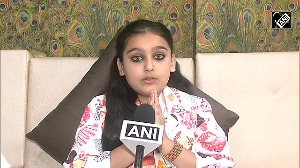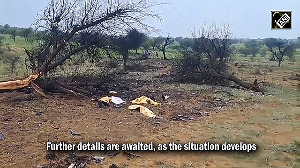The Association François-Xavier Bagnoud (AFXB), founded by Countess Albina du Boisrouvray, fights AIDS in 18 countries all over the world. The Countess has been visiting India since 15 years to do advocacy work, especially with children, and recently set up a day-long health fair on adolescent health in New Delhi. The event was sponsored by UNICEF, and saw stalls from local NGOs as well as international organisation such as the World Health Organisation. She talks with Business Standard about her work.
What kind of work does AFXB do?
"AFXB is a humanitarian organisation that I founded in 1989. Right now, AIDS is our main focus; we have 87 programmes ongoing in 18 countries in Africa, Latin America, Asia, and Europe, and in the United States, and a global staff of nearly 600.
Most of the work we do involves advocacy and awareness, and we have also set up homes for children who have been orphaned because of the AIDS virus, in countries like Brazil, Colombia, India, Thailand and the United States."
Why have you chosen to work specifically with children?
"Because my work lies mostly in advocacy, I realised that other communities have successfully mobilised themselves - feminist groups, for instance, or gay and lesbian groups.
They organise themselves into groups, have rallies and marches and so forth - but who speaks for the children? I am in India to amplify these children's voices. If they can be educated enough to know their rights, and then demand them, this will be a huge step. Even if nothing changes now, if they are 14, in four years they will be able to vote, and can voice their opinion that way. The important thing for them to know from early on is that they have a voice and how to use it."
What are you hoping to educate the children about?
"It is imperative that they know the kinds of rights that they have - to healthcare, to education and so on. Most countries have ratified the Convention for the Rights of the Child, and so technically all children living in these countries should be able to demand these rights. (Interestingly, the only two countries that have not ratified the treaty are Somalia and the United States!)
Each country also is able to ratify the treaty with their own reservations, for instance, some Muslim countries have made the reservation that the articles of the Convention should not contradict the Shariat laws. All of this has weakened the Convention somewhat, but still, it is a very strong step forward in the direction of children's rights, and children should be educated about it."
Tell us about the Barber Intervention Programme that you are planning.
"The Barber Intervention Programme will give local barbers information about HIV/AIDS, and train them to pass it on. Barbers are a great way of passing on information locally, as they are really a very crucial part of rural life. This is a completely unique idea, and we are very optimistic about it, especially in that it will target the key group of people who need to be targeted - the men.
According to a study, 90 per cent of HIV infection in India is transmitted by husbands to wives. We are implementing the Barber Intervention Programmes in 19 states across India. We are even training the barbers to refer clients seeking help to counselling and testing centres."
What else do you think needs to be done in the struggle against AIDS in India?
"I think a huge part of the battle is to fight social stigma. I have met so many people on my trips here who are not only suffering from AIDS, but have also been fired from their jobs or pushed aside from their families.
I think it is changing now though because a while ago, we sponsored a little girl whose parents had died of AIDS, and we asked for public donations and support. Not only did we raise enough money to buy her a house, we also received 200 letters in her support.







